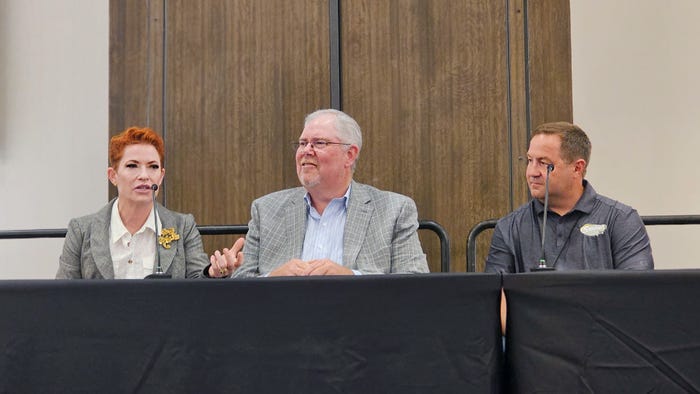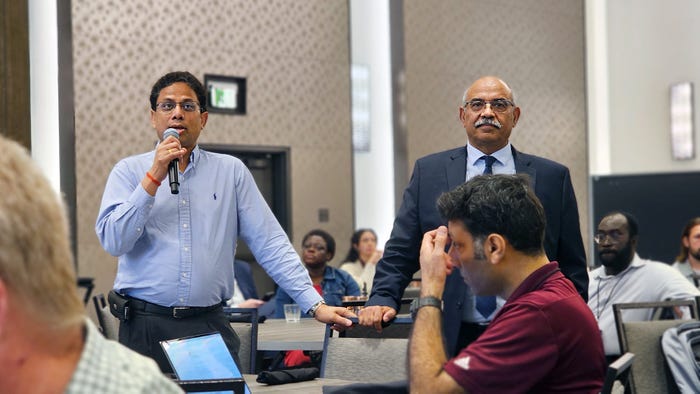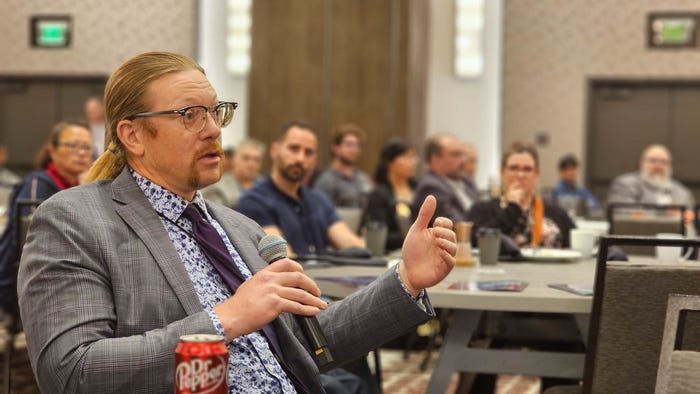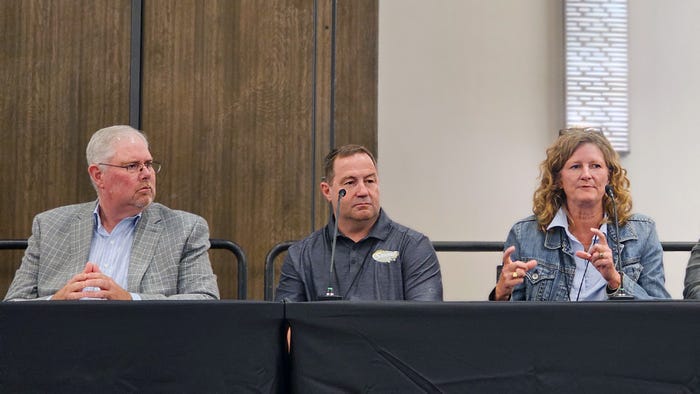
Grower Panel: U.S. producers relay what they need from AI to increase their efficiency and margins but also barriers to adopting that technology. Producers, from left, Lacey Vardeman, Slaton, Texas, Todd Straley, Plainview, Texas, and Travis Senter, Keiser, Arkansas.Shelley E. Huguley
There’s a fairly wide gap in both culture and knowledge base between the scientists who develop precision agriculture technology and the farmers who utilize it.
These groups must collaborate to feed a hungry and growing population, especially given water concerns and climate change. “We need to use any technology that can help us meet those needs,” says Ali Fares, Artificial Intelligence in Agriculture Conference co-chair.

Ali Fares, conference co-chair, right, gives the microphone to Binayak P. Mohanty, Texas A&M University regents professor & CoALS chair in Hydrologic Engineering & Sciences, during a morning session Q&A. (Photo by Shelley E. Huguley)
Texas A&M’s recent Artificial Intelligence in Agriculture and Natural Resources conference tried to span that gap by bringing the two groups together. More than 300 attendees heard from tech and university leaders, and a grower panel who shared pressing needs and concerns over artificial intelligence.
The panel was particularly beneficial for students, according to Seth Murray, the event’s other co-chair.
“What we heard from that panel, over and over, is that they want the easy button. AI can certainly help with that,” he says, highlighting the importance of letting students hear directly from farmers because researchers don’t always understand farmers. The opposite is also true.

Seth Murray, Artificial Intelligence in Agriculture Conference co-chair.(Photo by Shelley E. Huguley)
Murray intimately understands this dichotomy. When he’s not teaching at the College Station university, he manages a farm about 15 minutes from campus. Even though he teaches about emerging farm technologies and helped organize the AI conference, the tools he uses on his own land are decidedly not tech-forward.
“My tractor is a 1965 John Deere 2510,” Murray says. While it isn’t AI-enabled, “Man, it’s a workforce. I’ve been on the gravel [reparing machinery] until 4 a.m. if something breaks.”
Farm data disconnect?
As a corn breeder, Murray says he tries to educate his peers on future technologies at annual meetings. It’s always a struggle because the research he engages with at the university, while grounded in scientific data, is “pretty disconnected from the farmer. Their question is: ‘How is this going to help me next year?’”

Grower Panel: Odem, Texas, producer Kelly Whatley, right, said, "If I had simple to use, simple to learn method of 'Today's the day to pull the trigger. 89 cents is it. 87 cents is it.' That would help us the most. What we need on our farm is we need to increase our yields and increase our margins and anything that takes away from margins, especially, it’s not going to get used." Also, pictured are producers Todd Straley, Plainview, Texas, left, and Travis Senter, Keiser, Arkansas. (Photo by Shelley E. Huguley)
Public sector research requires private sector investment to make it from lab to farm. That process can sometimes take a while. Even so, while the more than 100 research presentations on topics ranging from predictive modeling to drone imaging delivered at Texas A&M’s conference might not immediately impact the bottom line of American farmers, some of them will in the future. And given the stressors that shrink margins every year, it behooves farmers to take note of future innovation—even if it’s still a little abstract.
Connect with farmer needs
The opposite is also true.
Sometimes, Fares says university researchers can become too engaged with their own interests and lose sight of the bigger picture. Farmers, the end user, must remain at the center of all agricultural research. Afterall, they’re the ones who will ultimately implement the tools. And if it isn’t useful for farmers, it won’t make it very far.
“The conference highlights, in my opinion, the relationship between farmers and scientists, and the need for stronger collaboration and communication between all of these players,” Fares says. “Farmers need to be heard. We need to understand what their challenges are.”
Take a look through this gallery to see who attended this year's conference.
Read more about:
TechnologyAbout the Author(s)
You May Also Like








